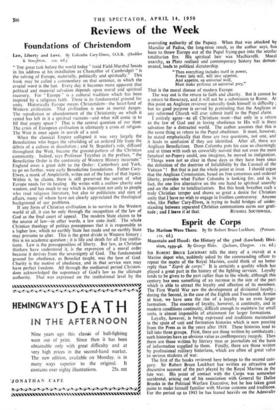Reviews of the Week
Foundations of Christendom
Law, Liberty and Love. By Columba Cary-Elwes, O.S.B. (Hodder & Stoughton. los. 6d.) " Tim great task before the world today " (said Field-Marshal Smuts in his address at his installation as Chancellor of Cambridge) " is
the salving of Europe, materially, politically and spiritually." This book may be called a commentary on that sentence, in which the crucial word is the last. Every day it becomes more apparent that political and material salvation depends upon moral and spiritual recovery. For " Europe " is a cultural tradition which has been inspired by a religious faith. There is its fundamental ground for unity. Historically Europe means Christendom—the heart-land of Western civilisation. That civilisation is now in mortal danger. The repudiation or abandonment of the Christianity on which it rested has left in it a spiritual vacuum—and what will come in to fill that empty space ? That is the central question of our time. The crisis of European civilisation is ultimately a crisis of religion. The West is once again in search of a soul.
When the classical Empire collapsed it was very largely the Benedictines who began the rebuilding of an ordered life from the debris of a culture in dissolution ; and St. Beuedict's rule, diffused throughout the West, became the ground-pattern of the Christian community. Indeed, says Professor Toynbee in the preface, " the Benedictine Order is the continuity of Western History incarnate." England owes a great debt to the Order: Canterbury and York, to go no further, were early Benedictine foundations. Father Cary- Elwes, a monk of Ampleforth, writes out of the heart of that legacy. Within it, he claims, there is still preserved the secret of what Europe needs for its healing. He writes with a mellow charity and wisdom, and has much to say which is important not only to people who read religious literature, but also to politicians and men of affairs, many of whom have not clearly appreciated the theological background of our problems.
If any form of Christian civilisation is to survive in the Western world at all, it can be only through the recognition of the law of God as the final court of appeal. The modern State claims to be the source of law—in other words, a law unto itself. The whole Christian theology of politics presupposes that it is responsible to a higher law, which no earthly State has made and no earthly State may presume to alter. This is the great divide in Western history ; this is no academic question ; it is life and death for all free institu- tions. Law is the presupposition of liberty. But law, as Christian thinkers have understood it, is the expression of a moral order because it derives from the sovereignty of God. The fundamental ground for obedience, as Benedict taught, was the love of God. Charity is the motive of obedience, and in that service men may have perfect freedom. All through the mediaeval period Christen- dom acknowledged the supremacy of God's law as the ultimate authority. That was expressed on the institutional level by the overriding authority of the Papacy. When that was attacked by Marsilio of Padua, the long-term result, as the author says, has been to throw Europe out of the Papal frying-pan into the secular totalitarian fire. His spiritual heir was Machiavelli. Moral anarchy, as Plato realised and contemporary history has demon- strated, leads to political dictatorship.
"Then everything includes itself in power, Power into will, will into appetite, And appetite, an universal wolf, Must make perforce an universal prey."
That is the moral disease of modern Europe.
The way out is the return to faith and charity. But it cannot be a return to theocracy, and it will not be a submission to Rome. At this point an Anglican reviewer naturally finds himself in difficulty ; but no good purpose is served by pretending that the Anglican or any reformed Church will ever submit itself to the Papal claim.
I entirely agree—as all Christians must—that only in a return to the law of God and in loving obedience to His will is there salvation for a distracted world. The author assumes that this is the same thing as return to the Papal obedience. It must, however, be stated emphatically that these are two questions, not one, and it leads to confusion if they are identified. After all, there are Anglican Benedictines. Dom Columba puts his case so charmingly and at times with such an unworldly naiveté that not even the most fanatical no-Popery could, one imagines, be moved to indignation. " Things were not so clear in those days as they have been since the definition of the doctrine of Infallibility by the Council of the Vatican "1 But that is just the whole point at issue. I should argue that the Anglican Communion, based on free consensus and ordered liberty, provides what Father Columba is looking for, and is, in fact, the one live alternative on the one hand to spiritual anarchy and on the other to totalitarianism. But this book breathes such a truly Christian temper and shows so great a desire for Christian unity that I have no wish to engage in fruitless controversy. Anyone who, like Father Cary-Elwes, is trying to build bridges of under- standing between separated Christian communions earns our grati-






































 Previous page
Previous page